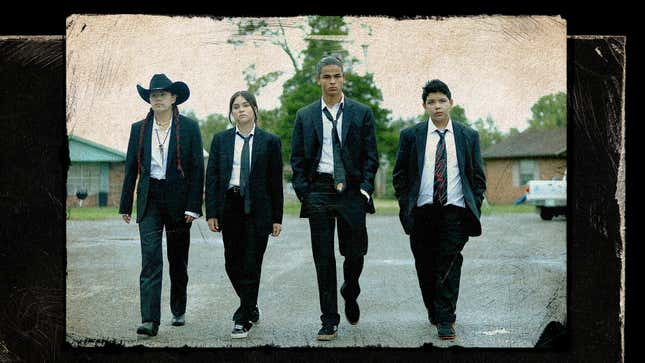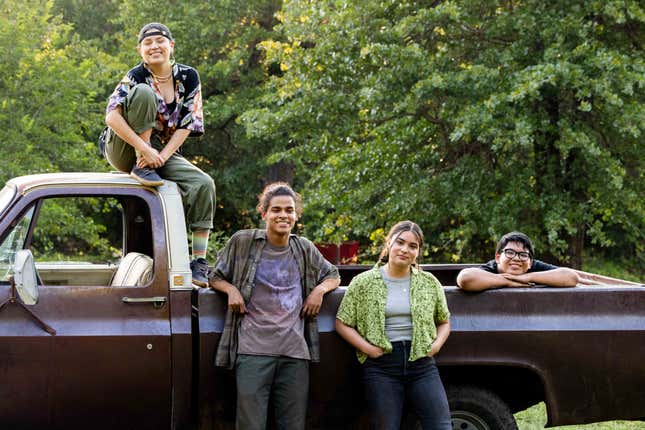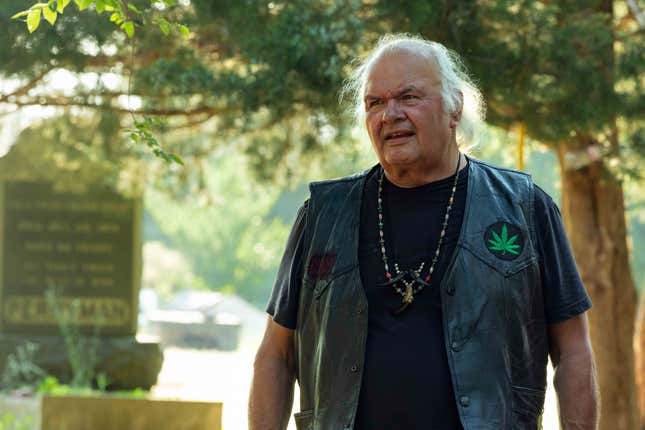
[Editor’s note: This piece contains spoilers of Reservation Dogs’ series finale.]
It’s fitting that the series finale of Reservation Dogs (“Dig,” written by Sterlin Harjo and Chad Charlie) is a community-driven sendoff. On the occasion of Old Man Fixico’s death, the episode finds the project’s central characters—the four teens who give the show its title—joining their elders in giving this most esteemed member of their community the funeral he deserves. And it’s hard not to see the installment as a gesture to the very spirit—the very core—of what this critically acclaimed series is really about. After all, the episode stresses the strong sense of intergenerational community that characterized Reservation Dogs throughout its three-season run—both in front of the camera and behind it.
When I interviewed Blackhorse Lowe, the director responsible for episodes like “Uncle Brownie” in season one and, more recently, the ’70s-set “House Made Of Bongs,” I asked him what it was about his experience on Reservation Dogs that he would most fondly look back on. He was unequivocal. “The sense of family is the big thing,” he told me. “I have to say that the community there and especially the filmmaking community in Tulsa, Oklahoma, is just so tight; everyone really knows one another. Everyone hangs out with one another, and connects with one another, drinks with one another, smokes weed with one another—it was just very much a family environment. You really don’t get to live an experience like that on other sets.”
Lowe’s words feel like the fulfilled promise of what Harjo and co-creator Taiki Waititi had first envisioned for the show. Speaking with The New York Times ahead of its premiere back in 2021, Harjo shared how unbelievable it had felt to be able to build a Native show from the ground up with an all-Indigenous writers’ room—not to mention a stacked ensemble cast that included both newcomers like Lane Factor (scene-stealing as the wryly sardonic Cheese) as well as veterans long overdue for recognition like Zahn McClarnon (hilarious as Officer Big).
“Our communities are filled with amazing talented people,” he told The Times. “But we are the descendants of people who survived genocide, forced removal and displacement, so we don’t leave home as easily as others. We don’t just go to L.A. and say, ‘I’m going to be an actor.’ So you have to find those people.”

And find them he did. Reservation Dogs—like Rutherford Falls and Spirit Rangers—now stands as a prime example of a new crop of shows that have helped put Native talent front and center. And the series did so by embracing the expansiveness of its own storytelling. At times a genre-aping farce that cheekily nodded to pop culture (see, for instance, the show’s title) and at others a probing if still witty examination of Native trauma in residential schools (as in season three’s excellent “Deer Lady”), and always playing around with all kinds of storylines throughout its three-season run, Reservation Dogs never felt constricted by its own premise.
Instead, the show used Bear, Elora, Willie Jack, and Cheese as centrifugal narrative forces that let its many writers plumb, with humor and heart, the many issues, big and small, that afflict Native communities today. And it did it all while winking at its audience with a cutting comedic sensibility owed in no small part to the 1491s, the Native sketch-comedy group whose members (including Harjo, Dallas Goldtooth, Migizi Pensoneau, Ryan RedCorn, and Bobby Wilson) played key roles in making the show.
The tricky tonal balance Reservation Dogs deftly toed on any given episode remains, perhaps, the show’s greatest achievement. This was a series that in its final episode, for instance, found time between melancholy reminiscences about a late elder to make eggplant-related sex jokes, not to mention a killer burner account social media quip courtesy of its hapless spirit. And it handily did so because it trusted its many collaborators; the show knew when to deploy the likes of Lily Gladstone (or Ethan Hawke!) to full effect, and when to, for instance, further nurture its own, creating a welcome pipeline for folks like Lowe, who have gotten a chance to make their mark on a now Peabody award-winning show.
It truly took a village.
And therein lay the very message of the show in a nutshell. The wayward ways of Bear (D’Pharaoh Woon-A-Tai), who for much of the series struggled with finding his path following the loss of his friend Daniel, concluded with a lesson as simple as it is powerful. “I learned that I don’t got to be the only leader,” Bear tells William Knifeman (Goldtooth) in the final moments they share together in the finale. “That I’m from an amazing community and I’m just proud to be a part of it!”

He may as well be talking for every member of the cast and crew who were involved in the series. At a time when auteurist television continues to be celebrated, Reservation Dogs serves as a reminder that the best long-form storytelling on the small screen still comes from a place of playful collaboration. It’s a message that feels all the more timely given the historic WGA strike this year. It is only through community, through the bonds one forges with those like (and unlike) themselves, that action and artistry flourish.
Against the rugged individualism of late-stage capitalism, the Rez Dogs have stood for a different kind of future made possible by embracing a collectivity that doesn’t sand down edges but that celebrates everyone’s various talents. To quote a lyric from the song featured in that final episode, “We’ve got to trust each other blindly / Only then will we have eyes to see.”
Rather than be wistful about Reservation Dogs ending, “Dig” encourages us to look forward (even as we’re nudged to acknowledge the past). The actual final line of the show, the one Harjo and his cast and crew leave us with, is “Till the next one.” The characters are talking about the next funeral they’ll have to oversee. But it’s hard not to hear in those words a metafictional plea for the chance for other shows to similarly get not just their chance but their flowers. Trailblazing as it may have been, Reservation Dogs knows it doesn’t stand alone nor on its own. It stands on the shoulders of those who came before it and those it came up alongside. Here’s hoping there’ll be many more like it in the future. Till the next one!